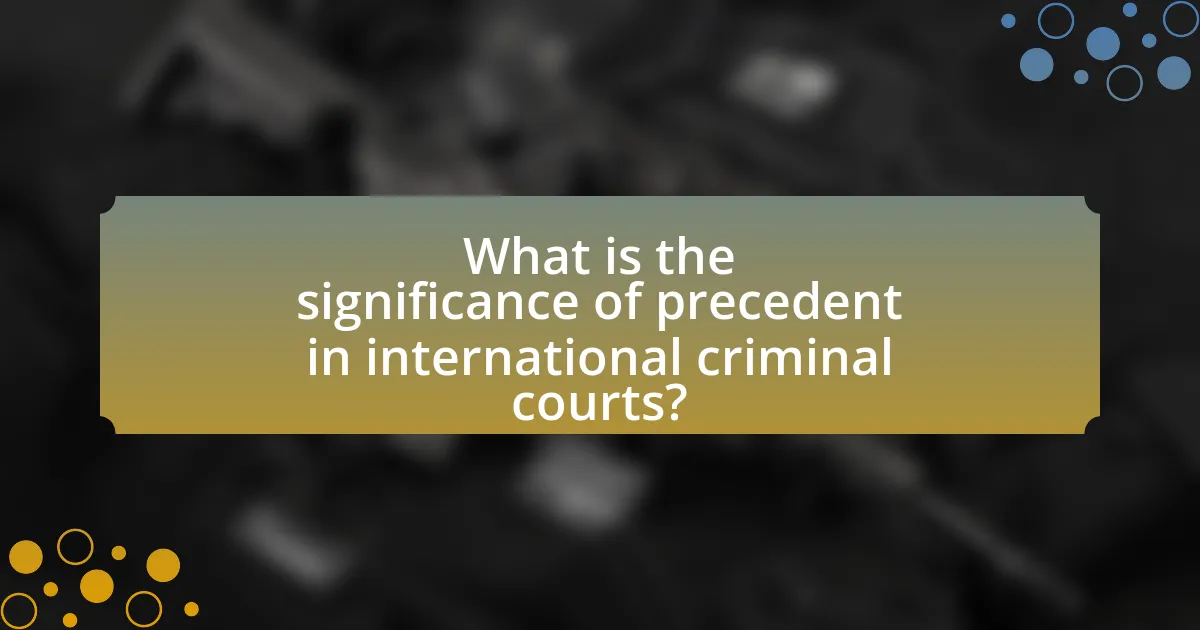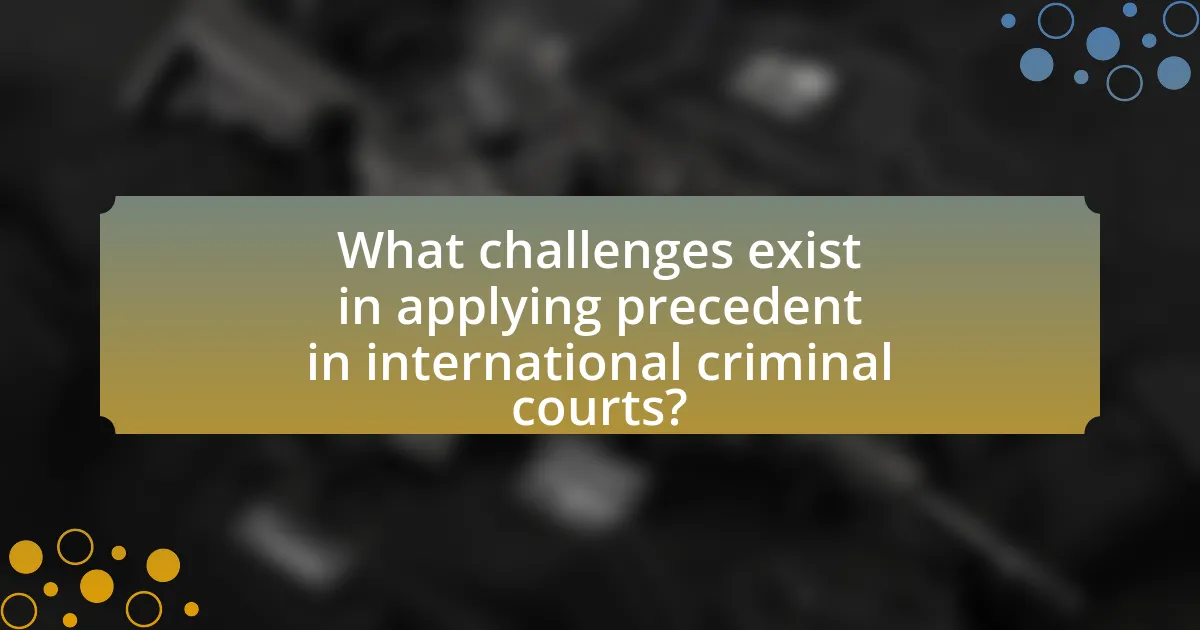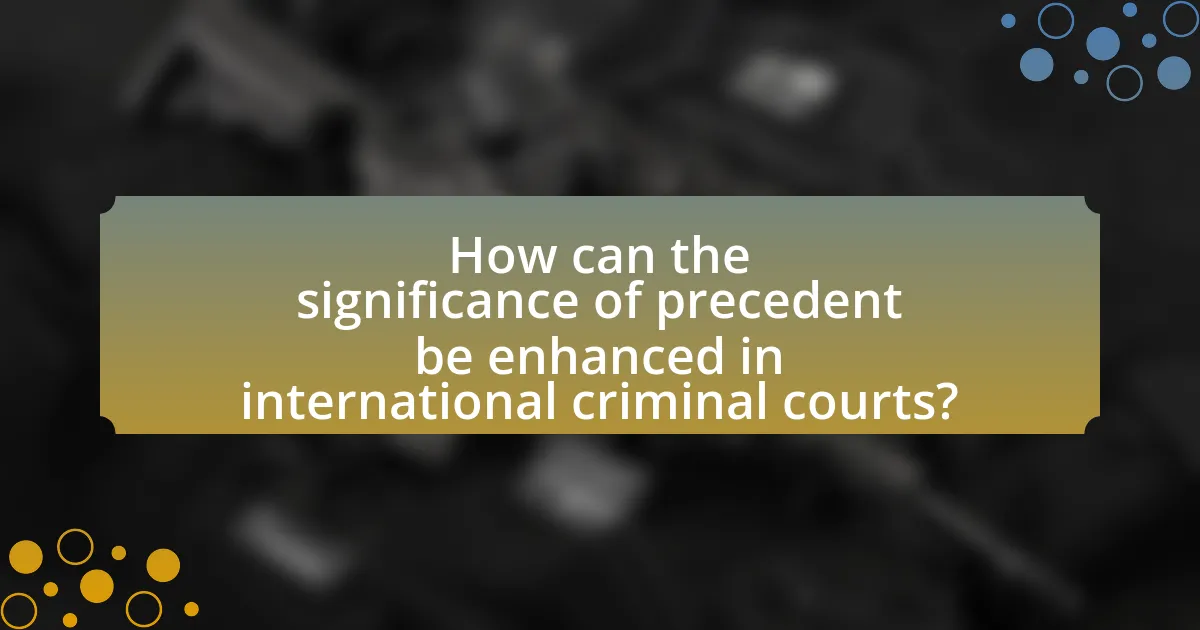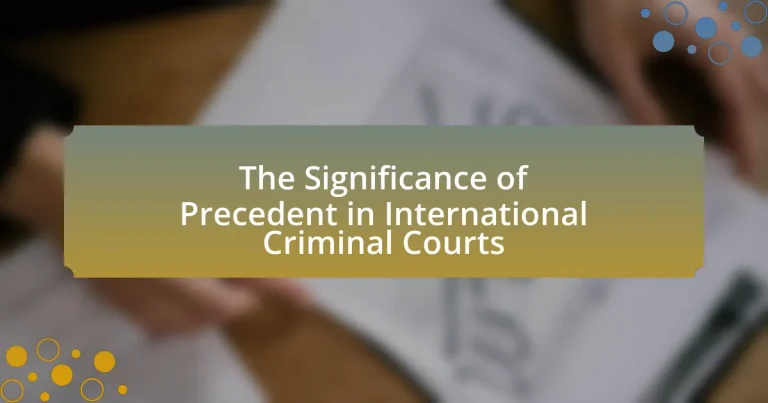The article focuses on the significance of precedent in international criminal courts, emphasizing its role in establishing legal standards and ensuring consistency in judicial decision-making. It explores how precedents influence the interpretation of international law, the principles of stare decisis, and the challenges faced in applying these precedents across different legal traditions. Additionally, the article discusses the implications of cultural differences, the limitations of relying on precedent, and potential reforms to enhance its application in international criminal law. Overall, it highlights the importance of precedent in maintaining fairness, legitimacy, and the development of legal standards within the international judicial framework.

What is the significance of precedent in international criminal courts?
Precedent in international criminal courts is significant because it establishes legal standards and guidelines that influence future cases. This reliance on prior decisions ensures consistency in the application of law, which is crucial for maintaining fairness and justice in international legal proceedings. For instance, the International Criminal Tribunal for the former Yugoslavia (ICTY) set important precedents regarding war crimes and crimes against humanity, which have been referenced in subsequent cases by the International Criminal Court (ICC). Such precedents help to shape the interpretation of legal principles and contribute to the development of international criminal law, thereby enhancing the legitimacy and credibility of the judicial process.
How does precedent influence judicial decision-making in these courts?
Precedent significantly influences judicial decision-making in international criminal courts by providing a framework for consistency and predictability in legal rulings. Courts rely on previous decisions to guide their interpretations of law, ensuring that similar cases are treated alike, which upholds the principle of fairness. For instance, the International Criminal Court (ICC) often references prior judgments to establish legal standards, as seen in cases like the Prosecutor v. Lubanga, where earlier rulings shaped the court’s approach to defining war crimes. This reliance on established precedents not only aids judges in making informed decisions but also enhances the legitimacy of the court’s authority in the eyes of the international community.
What are the key principles of precedent in international law?
The key principles of precedent in international law include the doctrine of stare decisis, the binding nature of decisions from higher courts, and the persuasive authority of decisions from international tribunals. Stare decisis ensures that similar cases are decided consistently, promoting legal certainty and stability. Decisions from higher courts, such as the International Court of Justice, are binding on lower courts and states, reinforcing the hierarchy of legal authority. Additionally, rulings from international tribunals, while not binding, serve as persuasive authority, influencing future cases and contributing to the development of international law. These principles collectively enhance the coherence and predictability of legal outcomes in international law.
How do judges interpret and apply precedent in their rulings?
Judges interpret and apply precedent in their rulings by analyzing previous court decisions to ensure consistency and predictability in the law. This process involves examining the legal principles established in earlier cases, determining their relevance to the current case, and applying those principles to reach a decision. For instance, in international criminal courts, judges often refer to landmark cases such as the International Criminal Tribunal for the former Yugoslavia’s rulings, which set important precedents regarding war crimes and crimes against humanity. By adhering to these precedents, judges reinforce the rule of law and contribute to the development of legal standards in international criminal justice.
Why is precedent important for the consistency of international criminal law?
Precedent is important for the consistency of international criminal law because it establishes a framework for interpreting legal standards and ensures uniformity in judicial decisions. This consistency is crucial for maintaining the rule of law and fostering trust in international legal institutions. For example, the International Criminal Court (ICC) relies on previous rulings to guide its judgments, which helps to create predictable outcomes in similar cases. This reliance on established precedents, such as the case of Prosecutor v. Thomas Lubanga Dyilo, reinforces the legal principles of accountability and justice, thereby enhancing the legitimacy of international criminal law.
How does precedent contribute to the legitimacy of international criminal courts?
Precedent contributes to the legitimacy of international criminal courts by establishing consistent legal standards and reinforcing the rule of law. This consistency ensures that similar cases are treated similarly, which enhances public trust in the judicial process. For instance, the International Criminal Tribunal for the former Yugoslavia (ICTY) set important precedents regarding war crimes and crimes against humanity, which have been referenced in subsequent cases, thereby promoting a coherent legal framework. Such reliance on established rulings not only guides judges in their decisions but also signals to states and individuals that the courts operate under a predictable and fair legal system, thereby bolstering their legitimacy.
What role does precedent play in the development of legal standards?
Precedent plays a crucial role in the development of legal standards by providing a framework for consistency and predictability in judicial decisions. Courts rely on previous rulings to guide their interpretations of law, ensuring that similar cases are treated alike, which fosters stability in the legal system. For instance, the principle of stare decisis mandates that lower courts follow the legal precedents established by higher courts, thereby reinforcing the authority of established legal standards. This reliance on precedent not only shapes the evolution of legal norms but also influences the interpretation of international law, as seen in cases adjudicated by international criminal tribunals, where past decisions inform current judgments and contribute to the development of customary international law.

What challenges exist in applying precedent in international criminal courts?
Applying precedent in international criminal courts faces several challenges, primarily due to the lack of a unified legal framework and varying interpretations of international law. Different jurisdictions may have distinct legal traditions and procedural rules, which complicates the consistent application of precedents. Additionally, the principle of complementarity, which allows national courts to prosecute crimes before international courts intervene, can lead to conflicting legal interpretations and outcomes. Furthermore, the evolving nature of international law means that precedents may become outdated or irrelevant, making it difficult for courts to rely on them consistently. These challenges are evidenced by cases such as the International Criminal Tribunal for the former Yugoslavia, where differing interpretations of legal standards have led to inconsistent rulings.
How do differing legal traditions impact the use of precedent?
Differing legal traditions significantly impact the use of precedent by shaping how courts interpret and apply previous rulings. In common law systems, such as those in the United States and the United Kingdom, precedent is a fundamental principle where past judicial decisions bind future cases, promoting consistency and predictability in the law. Conversely, civil law systems, like those in France and Germany, prioritize codified statutes over judicial decisions, leading to a more limited role for precedent. This distinction affects how international criminal courts, which often draw from both traditions, navigate the application of precedent. For instance, the International Criminal Court (ICC) may reference past decisions for guidance but is not strictly bound by them, reflecting a hybrid approach influenced by both common and civil law traditions.
What are the implications of common law versus civil law approaches?
Common law and civil law approaches have significant implications for the legal systems in international criminal courts. Common law, characterized by case law and judicial precedents, emphasizes the role of previous court decisions in shaping legal outcomes, which can lead to greater consistency and predictability in rulings. In contrast, civil law relies on codified statutes and comprehensive legal codes, which can result in a more rigid application of law but may lack the flexibility to adapt to unique cases.
The implications of these differences manifest in how international criminal courts interpret laws and apply justice. For instance, common law systems may allow for more interpretative flexibility, enabling judges to consider the context of cases and adapt legal principles accordingly. Conversely, civil law systems may prioritize adherence to established codes, potentially limiting judicial discretion and the ability to address novel legal issues.
These foundational differences influence the development of legal doctrines, the role of judges, and the overall approach to justice in international criminal law, affecting how cases are prosecuted and adjudicated across different jurisdictions.
How do cultural differences affect the perception of precedent?
Cultural differences significantly affect the perception of precedent by influencing how legal principles are interpreted and applied in various jurisdictions. For instance, common law systems, prevalent in countries like the United States and the United Kingdom, emphasize the importance of judicial decisions as binding precedents, while civil law systems, found in countries such as France and Germany, prioritize codified statutes over case law. This divergence leads to varying degrees of reliance on precedent; in common law cultures, judges often view past rulings as essential guides for future cases, whereas in civil law cultures, judges may regard precedents as persuasive but not obligatory. Research by the International Institute for the Sociology of Law highlights that cultural attitudes towards authority and tradition shape these legal frameworks, demonstrating that cultural context is crucial in understanding how precedent is perceived and utilized in international criminal courts.
What are the limitations of relying on precedent in international criminal cases?
Relying on precedent in international criminal cases has significant limitations, primarily due to the lack of a unified legal framework across jurisdictions. This inconsistency can lead to varying interpretations of similar cases, undermining the predictability and uniformity essential for justice. Additionally, international criminal law often deals with unique circumstances that may not have direct precedents, making it challenging to apply past rulings effectively. Furthermore, the evolving nature of international law means that precedents may become outdated or irrelevant as new legal standards emerge, complicating their applicability in contemporary cases. These factors collectively hinder the effectiveness of precedent as a guiding principle in international criminal jurisprudence.
How can the uniqueness of cases challenge established precedents?
The uniqueness of cases can challenge established precedents by introducing novel facts or legal issues that differ significantly from prior rulings. For instance, in international criminal law, cases like the International Criminal Tribunal for the former Yugoslavia’s ruling in the Tadić case established that the definition of armed conflict could be interpreted in various ways, thereby influencing subsequent cases. This adaptability allows courts to reconsider and potentially overturn previous decisions when faced with unique circumstances, demonstrating that the rigidity of established precedents can be mitigated by the distinctiveness of individual cases.
What are the risks of rigid adherence to precedent in evolving legal contexts?
Rigid adherence to precedent in evolving legal contexts poses significant risks, including the potential for injustice and the stifling of legal innovation. When courts strictly follow established precedents without considering the unique circumstances of new cases, they may perpetuate outdated interpretations that do not align with contemporary societal values or legal standards. For instance, in international criminal law, reliance on past rulings can hinder the adaptation of legal frameworks to address emerging crimes or human rights violations effectively. Historical examples, such as the Nuremberg Trials, illustrate how evolving norms necessitate flexibility in legal interpretations to ensure justice is served in a manner that reflects current ethical standards. Therefore, while precedent serves as a guiding principle, its rigid application can obstruct the legal system’s ability to respond to new challenges and uphold justice.

How can the significance of precedent be enhanced in international criminal courts?
The significance of precedent in international criminal courts can be enhanced by establishing a more systematic approach to the documentation and application of judicial decisions. This can be achieved through the creation of comprehensive databases that compile case law, making it accessible for judges and legal practitioners. For instance, the International Criminal Court (ICC) has made strides in this direction by publishing its decisions, which aids in the consistency of legal interpretations. Furthermore, encouraging the use of precedents in judicial reasoning during trials can strengthen their authority, as seen in the practice of common law jurisdictions where past rulings guide current cases. By integrating these practices, international criminal courts can ensure that precedents are not only recognized but actively utilized in shaping legal outcomes.
What best practices can be adopted to improve the application of precedent?
To improve the application of precedent in international criminal courts, adopting a systematic approach to case law analysis is essential. This includes establishing a centralized database of precedents that is easily accessible to legal practitioners, which enhances consistency in legal reasoning. Furthermore, regular training sessions for judges and legal professionals on the interpretation and application of precedents can ensure a uniform understanding of legal standards. Research indicates that jurisdictions with well-maintained precedent databases and ongoing legal education programs demonstrate higher rates of consistent rulings, thereby reinforcing the reliability of judicial decisions.
How can training and resources for judges enhance understanding of precedent?
Training and resources for judges can significantly enhance their understanding of precedent by providing structured knowledge and practical tools for interpreting and applying legal principles. Comprehensive training programs, which often include workshops, seminars, and access to legal databases, equip judges with the necessary skills to analyze past rulings effectively. For instance, the International Criminal Court (ICC) has implemented training initiatives that focus on the importance of precedent in ensuring consistent legal reasoning, thereby fostering a deeper comprehension of how previous decisions influence current cases. Additionally, resources such as annotated case law and legal commentaries serve as valuable references, enabling judges to contextualize precedents within the framework of international law. This structured approach not only improves judicial decision-making but also promotes uniformity in the application of law across different cases.
What role does legal scholarship play in shaping the use of precedent?
Legal scholarship plays a crucial role in shaping the use of precedent by providing critical analysis, interpretation, and theoretical frameworks that influence judicial decision-making. Scholars examine past cases, identify patterns, and articulate principles that guide courts in applying precedent consistently. For instance, legal scholars often publish articles that analyze landmark decisions, such as the International Criminal Court’s rulings, which help to clarify the implications of those decisions for future cases. This scholarly work not only informs judges but also contributes to the development of legal doctrines, ensuring that precedent is applied in a manner that reflects evolving legal standards and societal values.
What future trends may influence the significance of precedent in these courts?
Future trends that may influence the significance of precedent in international criminal courts include the increasing reliance on technology for evidence gathering and case management, as well as the evolving nature of international law. The integration of advanced technologies, such as artificial intelligence and data analytics, can streamline legal processes and enhance the ability to analyze past rulings, thereby impacting how precedents are interpreted and applied. Additionally, the dynamic landscape of international law, shaped by geopolitical shifts and emerging global issues, may lead to new interpretations of existing precedents or the establishment of novel legal standards. These trends suggest that the role of precedent may become more adaptable and responsive to contemporary challenges in international justice.
How might technological advancements affect legal research and precedent application?
Technological advancements significantly enhance legal research and precedent application by increasing efficiency and accessibility. Tools such as artificial intelligence and machine learning enable legal professionals to quickly analyze vast databases of case law, identifying relevant precedents with greater speed and accuracy. For instance, platforms like Westlaw and LexisNexis utilize advanced algorithms to streamline searches, allowing users to find pertinent cases based on specific legal issues or keywords. This capability not only saves time but also improves the quality of legal arguments by ensuring that practitioners can reference the most relevant and recent precedents. Additionally, the digitization of legal documents and the availability of online databases have democratized access to legal information, enabling a broader range of stakeholders, including smaller firms and self-represented litigants, to engage effectively with legal research.
What potential reforms could strengthen the role of precedent in international criminal law?
Potential reforms that could strengthen the role of precedent in international criminal law include the establishment of a formalized system for citing and applying precedents across different international tribunals. This reform would enhance consistency in legal interpretations and rulings, thereby promoting uniformity in the application of international law. For instance, the International Criminal Court (ICC) could adopt a centralized database of precedents that would be accessible to all member states and legal practitioners, facilitating the reference to previous rulings in new cases. Additionally, training programs for judges and legal professionals on the importance of precedent could further embed its role in judicial decision-making. Historical examples, such as the development of common law systems, demonstrate that a structured approach to precedent can lead to more predictable and fair outcomes in legal proceedings.
What practical steps can legal practitioners take to navigate precedent effectively?
Legal practitioners can navigate precedent effectively by systematically researching relevant case law, analyzing judicial reasoning, and applying findings to current cases. They should utilize legal databases to access historical rulings and identify binding precedents that influence their jurisdiction. Furthermore, practitioners must critically evaluate the context and implications of precedents, ensuring they understand how courts have interpreted similar issues over time. Engaging in continuous legal education and attending relevant seminars can also enhance their ability to interpret and apply precedents accurately. This approach is supported by the fact that effective precedent navigation can lead to more persuasive legal arguments and improved case outcomes, as demonstrated in various legal analyses and case studies.


